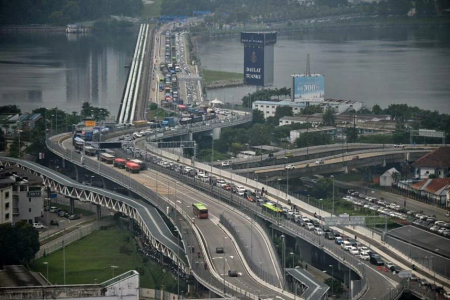S’pore drivers may be able to use credit, debit cards to enter JB by Sept 2024: Malaysia minister
KUALA LUMPUR - Malaysia is planning to allow drivers from Singapore to use their credit and debit cards to pay for the toll and road charge at the two border crossings into Johor by the end of the third quarter of 2024, allowing them to put aside their Touch ’n Go stored-value cards.
The government is in discussion with concessionaire Plus Expressways, which operates the road charge system at the Johor checkpoints at the Causeway and Second Link, to allow foreign visitors to use their internationally recognised credit and debit cards.
Such a system will first be rolled out by September 2023 at toll booths on 11 Malaysian highways.
“In the near future, foreign visitors can use their debit and credit cards to pay the toll on highways with the open payment system option, which is an alternative platform provided for drivers to pay toll charges using Mastercard and Visa debit and credit cards, besides Touch ’n Go cards,” Malaysia’s Works Minister Alexander Nanta Linggi told The Straits Times.
“Consumers will have the payment option and can travel at ease as they do not have to be worried about their Touch ’n Go card status,” he said.
He said implementation would take time at the two land crossings due to technical complexities involving different Malaysian agencies, but aims to have it kick off before September 2024.
The Singapore-Johor checkpoints are among the world’s busiest land crossings. Before the Covid-19 pandemic, about 415,000 people crossed the land borders daily, including tens of thousands of cars, vans and lorries. Motorcycles do not have to pay the border toll.
There has been a shortage of Touch ’n Go cards in both Singapore and Johor Bahru since the borders reopened between both sides in April 2022, inconveniencing those driving into Johor. Some were forced to use touts at the two Johor Customs, Immigration and Quarantine complexes (CIQs) to pay for tolls before they could enter Malaysia, The Straits Times reported in August 2022.
Frustrated Singapore drivers have called for alternative modes of payment, including the use of debit and credit cards, at the two CIQs.
Their call has dovetailed with the four-month-old Anwar Ibrahim administration’s plan – announced last week – to review all existing monopolies to ensure fairer and improved public services.
Malaysia has more than 35 tolled highways operated by more than 30 concession holders.
Touch ’n Go has a monopoly on the payment system for Malaysian highways, but the government said it will allow other players to come in, in what it calls an open payment system.
From September, one lane at toll plazas on 11 highways in Kuala Lumpur, Selangor, Penang and Kedah will accept credit and debit card payment for tolls.
The open payment system is a transition before the full implementation of a barrier-free multi-lane fast flow (MLFF) system, which is expected to be rolled out in phases from the third quarter of 2024, said Datuk Seri Nanta. Drivers will automatically be charged tolls without having to stop at a toll plaza.
There is a possibility that the MLFF system will be implemented at the two border crossings of Singapore as early as the third quarter of 2024, Mr Nanta said.
“However, the mechanism of payment of MLFF such as notification to users, and methods for registration and toll collection, are still being carefully considered,” he added.
On Tuesday, Malaysia’s Transport Minister Anthony Loke said the federal government has no plans to increase the RM20 (S$6) road charge imposed on foreign-registered vehicles that enter Malaysia via Johor.
“Any charges we impose – it will be reciprocated by the Singapore Government. If we increase the road charge, they will increase the fee for Malaysian-registered vehicles entering the country as well,” he said at a media conference.
Mr Loke was responding to a question after a Johor state politician suggested during the state assembly meeting on March 21 that the road charge should be increased as the RM20 fee was “too low” after conversion into Singapore’s currency.
Get The New Paper on your phone with the free TNP app. Download from the Apple App Store or Google Play Store now


